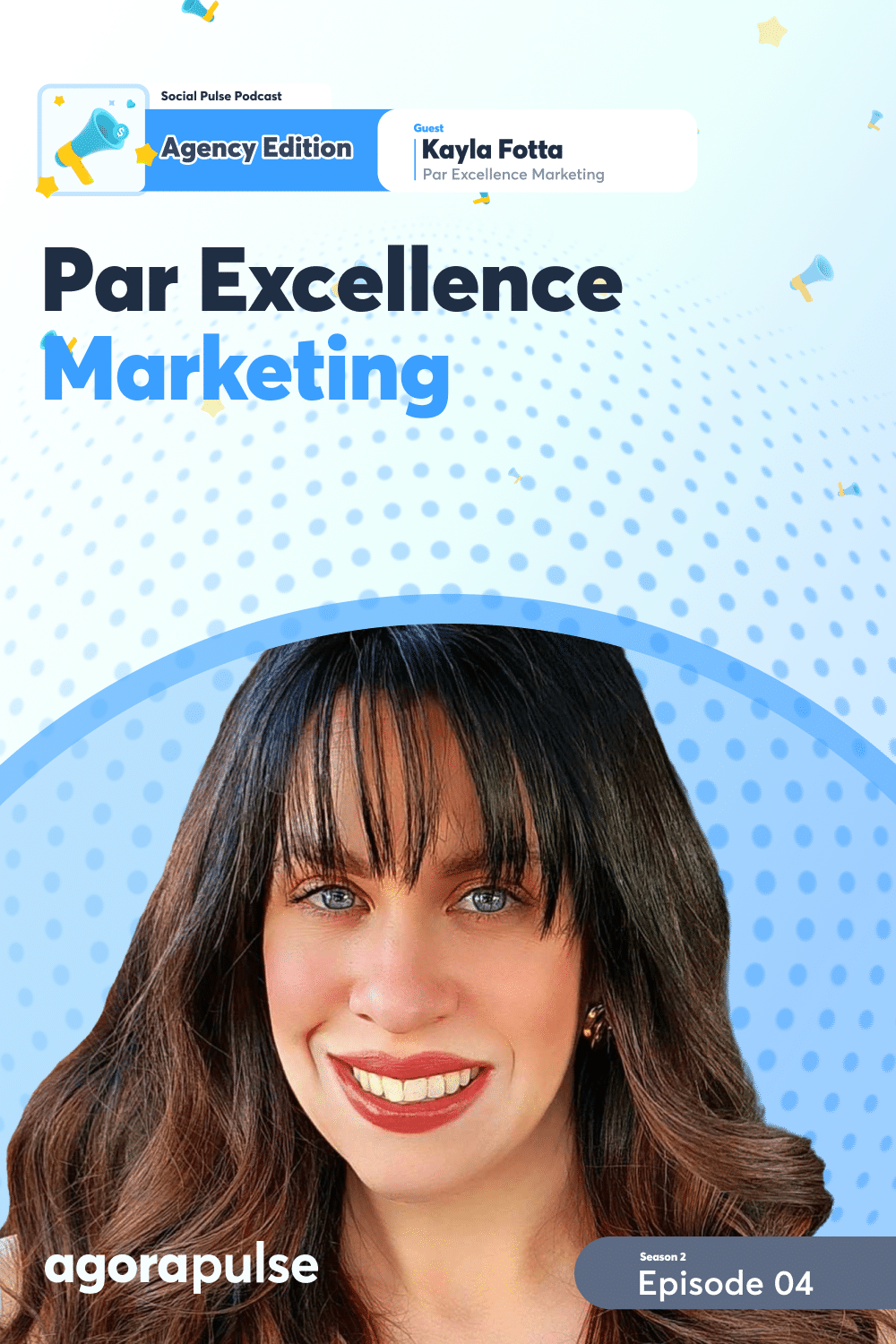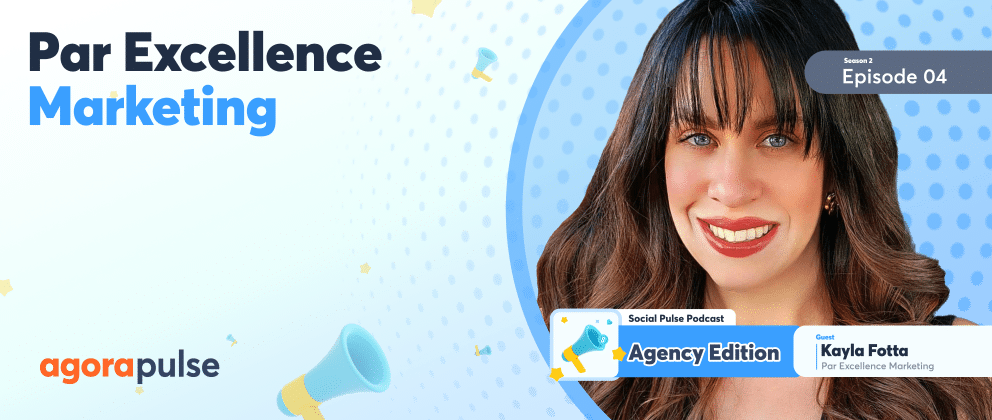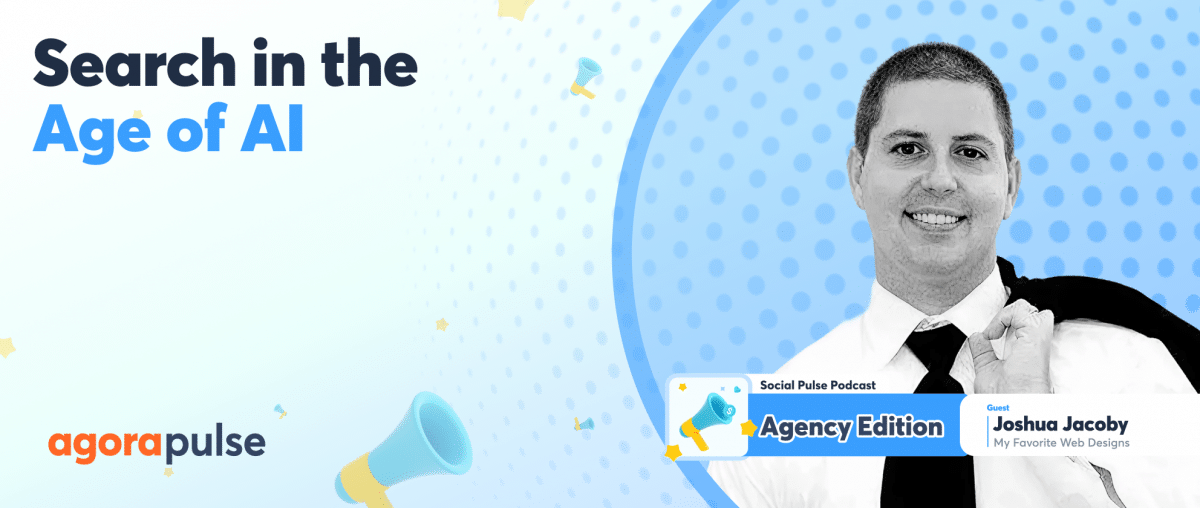Are you feeling the relentless pressure of scaling your agency while striving to maintain a semblance of work-life balance? When was the last time you took a vacation day? Often, the pursuit of growth can come at the expense of personal well-being.
But what if maintaining self-care could be a strategic advantage in achieving sustainable growth?
Listen to the podcast below to discover the answers to that question and more. Or keep reading for the transcript.
In this episode of Social Pulse Weekly: Agency Edition, we’re joined by Kayla Fotta, an expert in digital marketing and the brain behind Par Excellence Marketing. Kayla has mastered the art of balancing business growth with self-care, ensuring that both her agency and her personal life thrive. She’s developed effective self-care routines and organizational strategies that not only prevent burnout but also fuel her agency’s success. She’s going to share her journey, practical tips, and the powerful mantra that keeps her focused and driven.
Mike Allton, host of the podcast and Agorapulse’s chief storyteller: Let’s start by just discussing some of those big challenges that you faced when you were trying to grow your agency, and you were balancing and scaling that business with maintaining some semblance of self-care.
Kayla Fotta: One of the biggest things for me was just beginning to understand that everything has a time and a place. And that if you’re constantly focusing on everything that you have to do later, then you’ll never accomplish everything you have to do now. So just starting to understand that I need to give myself time for everything and that everything has its time and place has been vital for me.
Mike Allton: That’s a really important tip. And, honestly, I think that applies to everyone at all times—whether you’re in an agency or like me, working for a major corporation, having that mindset and truth—really, there’s a time and place for everything. We don’t necessarily always have to feel rushed.
What are some specific self-care routines that you follow that are helping you stay grounded and productive?
Kayla Fotta: Every day I have a set timer, and I have my entire schedule planned out every day. It’s the same, but it’s different. It’s the same weekly, but it’s different from day to day. I make sure that I give myself time to stretch in the morning and time to work out. I give myself time to do anything else in the afternoon that I might find relaxing. I might choose to do a face mask. I might decide to just sit and watch a movie, but giving myself that time and making sure that it’s planned out ahead has allowed me to become way more productive. It’s kept my mind a lot clearer, and it’s just been imperative to my day-to-day success.
Mike Allton: There are two takeaways right away for me.
The first is that you’ve identified some very specific self-care activities that you’re consciously carving out time for. I think that’s something that a lot of us simply don’t do. We don’t take that into consideration and plan that ahead.
The second sounds like you are taking the time every week to plan the next day or the week. When do you do that? Is it a week in advance? How often do you actually think about the next time up?
Kayla Fotta: So I look at things as what are my big goals? What do I want to accomplish? And I make sure that I write all of those things down. I use a very powerful tool called Notion, and it allows you to create, really, sky’s the limit. But I create tasks. I create goals in there for myself. And I know, for example, a couple of years ago, I really wanted to try Muay Thai. So I signed up for that. I’m also a very big proponent of “Don’t wait till tomorrow.” You don’t do it today because why not?
I have my full workout plan to the T. Same thing with meals, same thing with just general meetings, just putting them into the calendar, and making sure that everything is allotted.
Setting boundaries in scheduling
Mike Allton: I just read this powerful essay by Shaan Puri who was talking about what you’re just talking about: that we’ve been sold a lie that we’re told when we’re growing up, that the safe thing to do is to get a job and have a steady income and start a family. And then you can go on adventures later. And it really is a big lie because you don’t know what later is going to bring. And you’re missing out on all these opportunities when quite frankly, we’re young, and we could live on ramen and refills, and be courageous. And we don’t have responsibilities, or a mortgage, or that sort of thing. He actually broke it out to this chart of “ramen era versus mortgage era,” the likelihood to have freedom, right? It was super-powerful. I’ll include a link to that essay in the show notes, but I’m wondering how you integrate these routines into your busy schedule. We all know what it’s like to be an agency owner. You’re often facing tight deadlines and high demands from clients.
How does that work for you?
Kayla Fotta: Again, just focusing on the fact that everything has its time and place.
When you schedule everything out and create that visual aspect to look at what your day needs to look like, how long is this task going to take? And, again, in Notion, you can create those project timelines, and it’s a very powerful tool.
If, for example, one of the things that we do is build websites. So I know that a mock-up might take X amount of days, depending upon how big the project is. I know to incorporate enough time for that into other things. So, while I might have on Mondays and Wednesdays, I’m doing Muay Thai at the same time. It may not be at the exact same time of day. It depends on everything and just planning that out, moving things around, and giving myself time.
Mike Allton: It also sounds like you’re setting boundaries.
Kayla Fotta: Yes, absolutely. 100% yes. And that’s something huge to learn. It was a big thing for me to learn. I used to spend hours and hours at night. I would stay up sometimes till 2 a.m. just working on projects and driving myself crazy thinking, “Oh, I got to do this. I’ve got to do this.” And everything just becomes convoluted. Your brain is not clear. You are tired, you’re stressed out, and when you start to take the time and give yourself a little bit of grace and say, “I need to focus on this task at this time and this task at this time,” you accomplish so much more without all of the extra stress.
Self-care (but still keeping the peace)
Mike Allton: I’m wondering if you could share an example of when you’ve prioritized self-care and that actually helped you navigate some particularly challenging period in a business, maybe with a client or a particular project.
Kayla Fotta: Sure. There have been lots of times when I have felt a lot of pressure from deadlines to things coming up. I might have somebody that is upset. Not everybody’s always going to be happy with you all the time—but you need to remember to take that time to plan out whatever solution it’s going to be, really, in a case like that.
I actually had somebody that had reached out to me specifically, and she was very upset. She didn’t know what was going on with her Google Business accounts, and she started seeing all this different stuff. And I actually didn’t have anything directly to do with the issue at hand. But I was able to go in and look at that for her and say, “This is what the issue is. This is how we can resolve it.” I took care of it for her, and she was really, really happy, but just saying to her and being direct and saying, “I will go in and I’ll check it out for you. I’ll give you a response very soon, and I’ll let you know what I find.” That was enough to get her to say thank you and calm down a bit to where she wasn’t so worried.
So I was then able to plan everything out and say, “Okay, well, today I need to tackle this.”
Being able to have that clear brain and being scheduling everything and just making sure that everything is planned out was really, really helpful.
How do you keep your team, or how do you ensure that your team maintains that healthy work-life balance?
I’m really curious what an impact that’s actually had on your agency.
Kayla Fotta: There are a couple of things there.
Taking the time to find the right person who fits in with your company culture and somebody who has the same values as you do is very important.
When I look at hiring somebody, I don’t like to jump the gun. It can be very enticing when you see a really great resume to say, “Oh, I want that person.” But it’s very important to talk to somebody a couple of times. And make sure that they fit in, show them around your workplace, show them what you have to offer them, and see how they respond to that. So that’s the one thing is just making sure that you hire the right people for your business that have that same outlook as you.
Just having really good open communication. I make it a point.
You don’t need to be at your desk all day long staring at the computer. I think it’s really important that if you need to get up and stretch and take a lap around the building, take a lap around the building. Go out and get some sun for a minute if you need to. We have an on-site gym, and I know that I’m in there every day. I have an employee that visits the gym every day as well. I think just making sure that you have that line of communication there.
You don’t need to be worried that you need to stare at the computer all day. As long as you are getting your projects done, being able to move around and not feel so stressed is really important.
Mike Allton: Those are terrific points. In fact, we did an entire episode with Karl Sakas earlier in the season about hiring and how to deal with toxic employees and avoid that situation, which I think is very applicable here because it’s, again, just one more thing we need to be mindful of when we’re hiring.
Organizational Strategies
Mike Allton: Now, Kayla, I think some people listening to this might be thinking to themselves, “This sounds great, except I have all these things to do. I have so much on my plate. I can’t possibly carve out time for any of the things that you guys are talking about.”
What are some of the organizational strategies that you may have implemented that have allowed you to streamline your workload and by extension, then reduce stress?
Kayla Fotta: Step One is feeling comfortable with writing down your goals and then writing down the milestones on how you’re going to get there. I’m sure that everybody watching has heard the age-old saying, “Rome wasn’t built in a day.”
People sometimes look at the big picture, and they say, “Oh, that’s such an accomplishment that I have to make. How am I ever going to reach that goal? How am I going to get there?” They look at this 10,000-mile journey that they have to take, and they say, “That’s too much for me.”
But when you break it down and you really look at step one as “this is the first step that I have to take,” you take the initiative to do that.
Then you say, “This is step two. This is step three.” And you follow that path. Before you know it, you’re going to be on that 10,000-mile journey, and you’re going to hit 5,000 miles, 8,000 miles. Eventually, you’ll be at the end and you’ll say, “Wow, I really did it.”
I think just looking at the big picture but also looking at it from direct ground level as well and just really focusing on what the steps to get there are.
Mike Allton: Nice. Nice. That makes sense.
What advice would you have for some of the agency owners who are listening that maybe they’re struggling to find that balance between scaling their business and taking care of themselves?
Kayla Fotta: I think just identifying what goals you want to accomplish and then, from there, figuring out how to reach them. Like we just spoke about, give yourself some grace, give yourself some time, and really think to yourself, “What is step number one for me? What are the big things I want to accomplish? What are the little things I want to accomplish?”
Write it all down, create a plan, and also just understand that the plan isn’t always going to be smooth and by-the-numbers. Sometimes it’s going to be a little bit bumpy to get there, and your plan has to adapt—but just having that understanding and being able to refine things, that’s key.
Mike Allton: Couldn’t agree more. One of the things that I love about the work that you’re doing is because you’ve streamlined your agency so much, you’re not only finding time to do more self-care, you’re also finding time for charities.
Charity Work
Can you talk to us a little bit about the charitable work that you’re involved in and how these activities are aligned now with your professional and personal values?
Kayla Fotta: One of the really big things for me in starting my own company was being able to give back. I think it’s really, really important and vital to give back to the community in different ways.
I have a couple of things that are very important to me.
The first is that I am associated with an executive of a program that works with foster children in my state. One of the cool things (and an idea that I had and took to him) that he told me he had been working on as well, and I’m on his email chain. It’s very, very cool.
One thing that people don’t realize is that children in the foster care system don’t have ways to transport their belongings. They don’t get suitcases and things like that. A lot of times, they need to carry their belongings via trash bag. People really don’t understand or know that that’s an issue that’s occurring. So he’s actually working on creating a bag that he’s getting designed. And we’re going to be able to give it to those kids. I’ve worked a bit, as well, providing suitcases for different organizations, and so that’s one thing that’s very important to me because those children are our future, and it’s really important to focus on that.
A lot of people don’t realize how many kids are in that situation. And we’ll also have a chat box for people to join in on what they may have to deal with. And it’s even more important because as a kid, it’s harder to deal with things that you or I, as adults, can easily understand or overcome.
The other thing is we’re actually, as a company, working on planning a charity run for next year in the spring that is going to support two different causes. The first is the foster care system, and the second is domestic violence. So, anybody that’s struggling with that, we’re going to give to some organizations and help those individuals as well.
Like I said, it’s just really important to me to be able to give back and to be able to do things better for the community. I even have my daughter. She’s 13. I have her involved. We’ll go on a Sunday or Saturday morning at 6 a.m. and volunteer at our local rescue mission. And that’s it. It’s just you, you work, and that is great, but sometimes you need to feed your soul a bit as well.
Mike Allton: Those are beautiful initiatives. And I love your point about how oftentimes we don’t know the issues that certain segments are going through, particularly foster kids.
In your example, a friend of the show Joe Polizzi had a similar organization that he founded in Cleveland, the Orange Foundation, because he discovered through his own children that kids with autism are going through the school systems. They don’t have the technology that they need to keep up with the other children because the school systems don’t have the funding to buy technology. It’s out there. There are amazing computer systems, and so on that can be purchased. So he started a fundraising foundation to help them put that technology in schools. To your point, it’s the thing most people would have no idea unless you have that personal connection to that thing. So that’s phenomenal that that’s a focus of yours. And it’s so great that you’ve carved out that time, particularly for yourself and the organization.
What’s the most important takeaway you want our listeners to remember about balancing self-care and actually scaling their agencies?
Kayla Fotta: Allowing yourself time and patience and understanding that everything’s not going to go to plan and just making sure that you give yourself that ability to everything has its time and place.
Give yourself the ability to focus on the now versus the later. I promise you, your brain will be much clearer.
You’ll be able to accomplish a lot more, even though it seems like you’re not in the moment because you’re really like, “Oh, I’m putting that on the back burner.”
You’re not putting it on the back burner. You’re just focusing on what you need to do right now and increasing your productivity on each task.
Mike Allton: Terrific. Thank you, Kayla. We’ll have all the notes and all the links in the show notes for today’s show. That’s all we’ve got for today, friends, but don’t forget to find the Social Pulse Podcast: Agency Edition and give us a review. We’d love to know what you think. Until next time!






